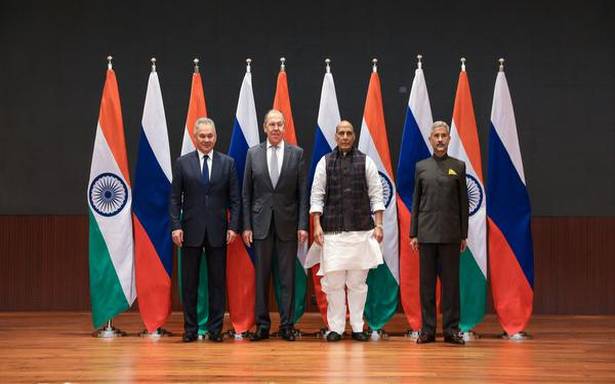Defence Minister Rajnath Singh addressed the ‘2+2’ dialogue where Russian Foreign Minister Sergey Lavrov, External Affairs Minister S. Jaishankar and Russian Defence Minister Sergei Shoigu are also participating.
India had faced ‘unprovoked aggression’ on its northern borders for more than a year, said Defence Minister Rajnath Singh on Monday during the first-ever India-Russia ‘2+2’ dialogue here. Both sides renewed the military-technical cooperation agreement for another 10 years till 2031 and also signed the deal for the manufacture of Ak-203 assault rifles, a defence official said.
“I had the opportunity to discuss in detail the emerging challenges India is confronted with and the enhanced requirement of India for closer military to military technical collaboration with Russia. The pandemic, the extraordinary militarisation and expansion of armament in our neighbourhood and unprovoked aggression on our northern border since early summer of 2020 has thrown in several challenges,” said Mr. Singh addressing the ‘2+2’ dialogue where Russian Foreign Minister Sergey Lavrov, External Affairs Minister S. Jaishankar and Russian Defence Minister Sergei Shoigu are also participating.
Mr. Singh sought “greater engagements in Central Asia and the Indian Ocean Region” during the talks.
The deal for 6.1 lakh Ak-203 assault rifles is estimated at over ₹5,000 crore and will be manufactured by a Joint Venture, Indo-Russian Rifles Private Ltd. (IRRPL) at Korwa, Amethi in Uttar Pradesh. The IRRPL was set up jointly between the erstwhile OFB [now Advanced Weapons and Equipment India Limited and Munitions India Limited] of India and Rosoboronexport and concern Kalashnikov of Russia.
The deal has been stuck over the high cost of each rifle and the high incidental costs of the Ordnance factory. As part of efforts to bring down costs, Russia dropped the royalty to be charged in the deal, officials confirmed. With the $5.43 bn S-400 as well other big ticket deals, the defence trade between India and Russia crossed $15 bn since 2018.
A bilateral logistics support deal Reciprocal Exchange of Logistics Agreement, as well as a Navy-to-Navy cooperation MoU are also in the works.
Russia has also begun deliveries of the S-400 long range air defence systems, the shipments of which are en route. They should arrive in the next 10 days, a senior defence official said. Two teams of Indian Air Force personnel have already been trained to operate the system and the first unit to be deployed in north west India is expected to be operational within the next two-three months.
‘Regional trust and global security’
Addressing the meeting, General Shoigu said the agencies concerned from both sides would collaborate with each other to increase “regional trust and global security”.
“We are meeting at a critical juncture in the geopolitical environment which is in great flux, especially after the COVID-19 pandemic. Our ties have been close and time-tested. We have had an active dialogue at a political level and a strong defence partnership over many years,” said Mr. Jaishankar who pointed out that globalisation was “over centralised” and sought multipolarity in world affairs. Mr. Jaishankar raised the condition of Afghanistan and said the situation there had “wider repercussions” in several regions, including for Central Asia. He also emphasised maritime security as a common area for the “special and privileged strategic partnership” between India and Russia.
Speaking in the meeting, Foreign Minister Sergey Lavrov pointed out the commonalities between Indian and Russian positions on international issues.
“Both India and Russia have a similar world view of a more polycentric, more multipolar, more equitable world order. We advocate similar or identical positions on the most important political and military issues. We speak in favour of international law. We adhere to non-interference in the domestic affairs of other countries,” said Mr. Lavrov at the launch of the new ‘2+2’ ministerial mechanism.
The meeting got under way hours before the arrival of President Vladimir Putin who is scheduled to arrive Monday evening and join Prime Minister Narendra Modi for the 21st India-Russia annual summit. The tradition of annual India-Russia summit was launched in 2000 during the premiership of Atal Bihari Vajpayee.
Source: Read Full Article

